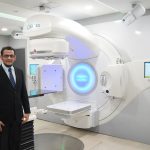By Associate Professor Dr Aminudin Rahman Mohd Mydin, Head of Oncology and Senior Consultant Clinical and Radiation Oncologist at Damansara Specialist Hospital.
However, half of Malaysian women with breast cancer present late at stages 3 and 4, including those younger than 50 years old. Awareness alone is not enough but needs to translate into action. This involves early detection with regular screening mammogram and effective, modern cancer treatment.
Breast cancer is one of the most treatable cancers but many cases are still diagnosed late. More young women being are being diagnosed with breast cancer, including during pregnancy.
In Malaysia, according to a University Putra Malaysia (UPM) study, about 13.6% of women are diagnosed with breast cancer before the age of 40, a significantly higher rate than in the United States, with incidence rates for younger women rising over the years. The disease is a leading cause of cancer-related deaths among Malaysian women, and a notable trend is the increasing diagnosis of advanced breast cancer in younger patients.
Data from the Malaysian National Cancer Registry Report 2017-2021, Ministry of Health Malaysia, revealed 50.5% of Malaysian women with breast cancer present at the advanced stages 3 and 4. When breast cancer is found early, the survival rate is high, but once it spreads, treatment becomes more complex, costly and life-changing.
More Women Under 50 Are Getting Breast Cancer
Young women with breast cancer face unique challenges, but advanced treatment options improve survival rates and quality of life. While the disease most often affects women over 50, more young women are being diagnosed at a time in life when many are focused on their careers, relationships, and family-building.
Some breast cancer treatments — while effective at treating the cancer — can have an impact on a woman’s fertility and other areas of health, from heart and sexual health to bone density. These potential effects need to be discussed and referral made to reproductive specialists for women considering having children in the future and building their careers.
Treatment options are becoming more precise
Recently, breast cancer biology is much better understood at the molecular and genomics level, leading to more effective treatments i.e. precision medicine and personalised oncology. Breast cancer can generally be divided into Hormone Receptor (Estrogen(ER) and Progesterone Receptors (PR)) positive, HER2 positive and Triple (ER/PR/HER2) Negative Breast Cancers (TNBC). A BRCA (Breast CAncer) 1 or 2 gene mutation is significantly more common in TNBC, with estimates ranging from 10% to 25% of TNBC cases compared to only about 5% of all breast cancers.
These mutations increase the risk of developing both breast and ovarian cancers, and cancers in women with a BRCA mutation are more likely to be TNBC. The presence of a BRCA mutation is also associated with a younger age at diagnosis and can influence treatment decisions, particularly the use of platinum-based chemotherapy and PARP inhibitors. With newer and advanced targeted therapies and immunotherapies, many late stage 4 metastatic breast cancer patients are surviving longer than 5 years with good quality of life.
Recent developments in radiotherapy such as Deep Inspiratory Breath Hold (DIBH) Breast Radiotherapy and Intraoperative Radiotherapy (IORT) have improved the treatment outcomes of breast cancer while minimising the side effects of breast radiotherapy.
With modern imaging techniques like 3D Mammogram and Breast MRI scans, even Stage 0 Breast Cancer (Breast Ductal Carcinoma In Situ – DCIS) can be detected, with a 100% cure rate with surgery and radiotherapy alone without the need for further chemotherapy or hormone therapy.
Awareness must lead to action. Screening has to be convenient and accessible for Malaysian women from all walks of life, both in urban and rural areas. All Malaysian women between the ages of 40 to 75 years are recommended to do breast cancer screening with breast mammograms every 2-3 years regardless of risk factors like age, family history, socioeconomic background or other risk factors. This recommendation is established in major international guidelines and consensus of medical experts.
DYMM Tengku Permaisuri Selangor officiates newly renovated Damansara Specialist Hospital Oncology Day Care Unit in conjunction with Pink October 2025
In conjunction with the Pink October Breast Cancer Awareness Celebration 2025, Damansara Specialist Hospital (DSH) was honoured to have Duli Yang Maha Mulia Tengku Permaisuri Selangor Hajah Norashikin, officiate the launch of the DSH Oncology Day Care Unit (ODCU) on the 1 st October 2025. Alongside DYMM Tengku Permaisuri Selangor, the other guests of honour are, Yang Berusaha Tuan Hj. Mohamad Zahri bin Hj. Samingon, Datuk Bandar Petaling Jaya, Mr. Chin Keat Chyuan, President & Managing Director of KPJ Healthcare, and Professor Emeritus Dato’ Dr Azizi Haji Omar, Board Member of KPJ Healthcare & Consultant Paediatrician and Paediatric Respiratory Physician at DSH. The event also witnessed meaningful contributions to 3 NGOs, Persatuan Kanser Kanwork (KanWork), National Cancer Society Malaysia (NCSM) and Majlis Kanser Nasional (MAKNA). DYMM Tengku Permaisuri Selangor is the Royal Patron of Kanwork.
Duli Yang Maha Mulia Tengku Permaisuri Selangor Hajah Norashikin visited the newly launched DSH ODCU. During the visit, DYMM Tengku Permaisuri Selangor graciously presented fruit baskets to each cancer patient and spent time engaging warmly in conversation with them, bringing comfort and encouragement. The visit marked a meaningful step forward in advancing cancer care at DSH, showcasing the commitment to providing comprehensive and compassionate treatment for cancer patients and their caregivers.
The ODCU provides a comprehensive range of therapies, including the latest chemotherapy and targeted treatments such as hormone therapy, angiogenesis inhibitors, immunotherapy and monoclonal antibodies. It also offers bone- strengthening medication for patients with bone metastases, alongside palliative and supportive care that focuses on symptom management and quality of life.
The upgraded facility now features a refreshed and calming environment with upgraded interiors and a dedicated treatment room for minor procedures. These enhancements reflect DSH’s commitment to ensuring patient comfort, privacy and holistic care.
At DSH, the multidisciplinary team of doctors, nurses and support staff work closely to ensure every patient receives care that is compassionate and empowering. With the upgraded Oncology Daycare Unit, DSH aim to provide a healing environment where patients and families can find strength and hope together.
DSH will continue to play its part by improving access to early screening, multidisciplinary expertise and patient education initiatives that encourage early intervention.
One of the patients who shared her experience with DYMM Tengku Permaisuri Selangor was Puan Siti Zaila binti Idrus, who discovered she had stage 4 metastatic breast cancer which had spread to the bones in December 2021 when she developed fracture of both her thigh bones (femur). This is a story of hope and faith from our cancer patient. Stage 4 breast cancer may have changed her life, but not her spirit.
For Puan Zaila, every day is a gift — made brighter by the love of her daughter and family, the strength from her company, colleagues and friends, and the faith that keeps her going. Now doing well in her 4th year of maintenance treatment with her oncologist, working full time and able to carry on her life normally, Puan
Zaila reminds us with her powerful words:
“Live like you’re going to live longer, rather than you’re going to die soon.”
Her journey is one of courage, faith, and the will to keep fighting — a beautiful reminder that life, even in its toughest moments, is still worth celebrating. At Damansara Specialist Hospital, trusted by generations, we’re committed to providing hope, healing and continuous care for every patient, their families and caregivers.
Associate Professor Dr Aminudin Rahman Mohd Mydin is the head of oncology and senior consultant clinical and radiation oncologist at Damansara Specialist Hospital. He is a Clinical Associate Professor at the Graduate School of Medicine, KPJ Healthcare University (KPJU), and an Executive Council member of War-on-Cancer Malaysia (WonC), an initiative by the College of Physicians, Academy of Medicine Malaysia to prevent, overcome and eliminate cancer in Malaysia. He is also an Honorary Member of Persatuan Kanser Kanwork (Kanwork) and a Clinical Advisor of the National Cancer Society Malaysia (NCSM).




